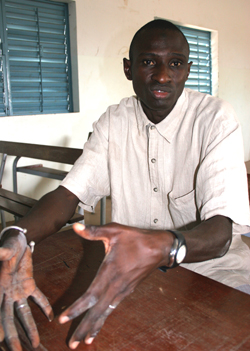You are here » Home » Telling Our Story
First Person
Teacher hopes that
gaining students’ trust could improve learning
Breaking Down Educational Barriers

Photo: Richard Nyberg, USAID/Senegal
"Teacher Aliou Badara Dabo explains his plans to further improve relations with his
students and his community in Dioulacolon, Senegal."
“[Teaching] is a profession I like very much. You do it because it is natural. Since my first year of teaching, I always said I am there for the children,” said Aliou Badara Dabo.
Aliou Badara Dabo remembers all too well his days as a secondary school student in Senegal’s southern Kolda region. Students, intimidated by their teachers, dared not ask important questions or share their concerns. Now a respected teacher and leader at a USAID-financed middle school in Dioulacolon, Aliou has helped change that.
“People used to look at the teacher like he was a god or a demigod. We are trying to lead a fight to end that and become more approachable,” said Aliou, a teacher of French, history and geography at his current school since 2002, and a native of the region. Speaking of the students, he said, “We consider each other as brothers. Between teacher and student, we need relations that work from an educational point of view, but also outside the school environment.”
The new philosophy seems to be catching on. “The teachers are always available,“ said Mariame Therese Kandé. “They are here, close by, so you can easily approach them, even after school hours.”
Aliou is one of the first teachers to begin teaching in the new classrooms of 30 rural middle schools built or expanded with USAID funding since 2003. Like many other teachers at middle schools, he had limited formal instructional training in teaching. After completing three years of study in law and French at the University of Dakar, he had three months of training at the Ministry of Education. Later, he attended USAID-financed training sessions on information technology and student motivation.
In breaking down barriers between teachers and students, Aliou is also particularly concerned on the barrier for girls to education. He has led a drive to meet parents house-by-house in nearby villages to explain the importance for girls to stay in school and not become pregnant as early teens. “Many young girls are reticent, because they do not have the chance to pursue their studies. Often they are told that they must take care of the household,” he said. “We tell parents that girls have the same capacity as the boys, and that students need to be given ample time for their studies to succeed.”
Print-friendly version of this page (533kb - PDF)
Click here for high-res photo
Back to Top ^ | 

